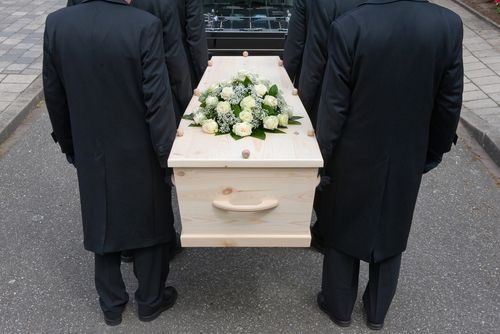 Attending a funeral can be difficult, whether it's for someone you knew well or if you are at the funeral to support a friend or family member. However, it can be hard to distinguish appropriate etiquette when it's the latter. You likely want to be there for your friend, but you may be worried you're overstepping or that you'll say something you shouldn't. Here are some tips for proper funeral etiquette.
Attending a funeral can be difficult, whether it's for someone you knew well or if you are at the funeral to support a friend or family member. However, it can be hard to distinguish appropriate etiquette when it's the latter. You likely want to be there for your friend, but you may be worried you're overstepping or that you'll say something you shouldn't. Here are some tips for proper funeral etiquette.
Find Out What To Wear
Black is a traditional funeral color, as it represents mourning. However, sometimes people want the funeral to be a celebration of life more than a mournful goodbye. They may request that you wear the deceased's favorite color or something that represents their favorite sports team. Get the information ahead of time, so you know how to dress appropriately. When in doubt, it's best to wear traditional funeral clothing.
Ask To Hear Stories
You can take things a step beyond saying something like "I'm sorry for your loss" and ask to hear stories about the person's life. This can be an excellent way for your friend to remember the good times and shows you genuinely care. If they aren't ready to share, give them time and offer a hug. If you know of some stories involving the person, feel free to share them. It can take the pressure off the mourning person to listen instead of share.
Send Something Other Than Flowers
While bouquets are a more traditional gift to send after someone loses a loved one, they can be overwhelming, and the flowers won't last long. Many other gifts can have a more substantial impact. These might include things like:
- Donating to a charity that the deceased was passionate about
- Planting a tree in their memory
- Giving them a piece of jewelry that has some way to remember their lost loved one (such as engraved initials or a picture)
Sit Towards the Back
Sitting near the back is best when you did not know the deceased well. The first two or three rows will generally be the immediate family and close friends, with extended family and friends sitting behind. Sit towards the back, so there's room for those who knew the person to sit closer to the front.
Consider Skipping the Burial
For the most part, funerals are open for anyone to attend, whether it's family and friends or others who are there to support the family. On the other hand, the burial can be even more emotional than the funeral. People may want privacy and feel awkward if there is a large group of people. However, this can vary on a case-by-case basis, so do whatever you think your friend would want.
Remember To Continue Supporting Your Friend
The funeral does not signify the end of the grieving process. While it does offer a level of closure, missing that person will never entirely go away. Avoid using phrases like "time heals all wounds," as they suggest that the person should be on a timeline to get over their grief.
Support them by checking in every once in a while, and be a shoulder to cry on if needed. If you are worried that the person has gone into a depression due to their grief, express your concern for them and suggest they attend grief counseling. Remember anniversaries as well, as they may be more challenging days than usual for them.
These are some simple ways to be there for your friend when they have lost a loved one. Simply being there and showing that you care goes a long way, and remembering to reach out after the funeral will show them that you still have their support.